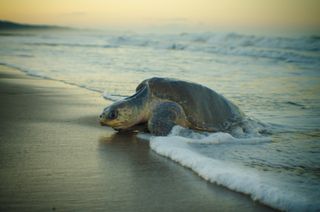113 Dead Sea Turtles Washed Up on a Mexico Beach, and No One Knows Why

Over a period of less than three weeks, more than 100 endangered sea turtles washed up dead on an 18-mile (30 kilometers) stretch of beach on the Pacific coast of Mexico near Guatemala, and authorities aren't sure why.
The mass mortality event began on July 24, when 26 dead turtles were discovered in the small tourist beach town of Puerto Arista in the state of Chiapas, Mexico's Federal Attorney for Environmental Protection (PROFEPA) reported. In the following days, officials recorded dozens more dead sea turtles in the area.
On Saturday (Aug. 18), PROFEPA reported that by Aug. 13, the number of dead turtles totaled 102 olive ridley sea turtles (Lepidochelys olivacea), six hawksbill sea turtles (Eretmochelys imbricate) and five Pacific black sea turtles (Chelonia mydas agassizii). All three species are classified by the Mexican government as critically endangered, PROFEPA reported. [In Photos: Tagging Baby Sea Turtles]
The dead turtles were all adults, including both males and females, and in various stages of decomposition. PROFEPA is performing necropsies on a few of the specimens and collecting tissue samples to help determine the cause of the deaths.
Wildlife experts suspect that some of the turtles died from interactions with fisheries operations in the area. Several of the turtles found on July 24 had injuries that appeared to come from a hooks or fishing nets, PROFEPA reported.
The coastal waters off Puerto Arista are part of a protected marine sanctuary, but sea turtles in the area are occasionally caught in legal fishing nets and drown. On Aug. 2, authorities met with fishers in the region and urged them to practice responsible fishing techniques that ensure protection of the endangered sea turtles, PROFEPA reported.
Authorities have also collected water samples in the area to test for the presence of harmful toxins from algae. On the Gulf Coast of Florida, a harmful algal bloom called a red tide has been responsible for the deaths of hundreds of fish, marine mammals and sea turtles. A similar algal toxin could be killing the sea turtles off the Pacific coast of Mexico, but authorities are still investigating, PROFEPA reported.
Sign up for the Live Science daily newsletter now
Get the world’s most fascinating discoveries delivered straight to your inbox.
Original article on Live Science.

Kimberly has a bachelor's degree in marine biology from Texas A&M University, a master's degree in biology from Southeastern Louisiana University and a graduate certificate in science communication from the University of California, Santa Cruz. She is a former reference editor for Live Science and Space.com. Her work has appeared in Inside Science, News from Science, the San Jose Mercury and others. Her favorite stories include those about animals and obscurities. A Texas native, Kim now lives in a California redwood forest.
Most Popular


